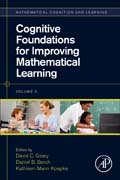
Cognitive foundations for improving mathematical learning
Geary, David C.
Berch, Daniel B.
Koepke, Kathleen Mann
Cognitive Foundations for Improving Mathematical Learning, Volume 5, the latest release in the Mathematical Cognition and Learning series, focuses on informal learning environments and other parental influences on numerical cognitive development and formal instructional interventions for improving mathematics learning and performance. Chapters cover the use of numerical play and games for improving foundational number knowledge, school math performance, the link between early math abilities and the approximate number system, and how families can help improve the early development of math skills. In addition, the book examines learning trajectories in early mathematics, the role of mathematical language in acquiring numeracy skills, evidence-based assessments of early math skills, approaches for intensifying early mathematics interventions, the use of analogies in mathematics instruction, schema-based diagrams for teaching ratios and proportions, the role of cognitive processes in treating mathematical learning difficulties, and more. Identifies the relative influence of school and family on math learningDiscusses the efficacy of numerical play for improvement in mathFeatures learning trajectories in mathExamines the role of math language in numeracy skillsIncludes assessments of math skillsExplores the role of cognition in treating math-based learning difficulties INDICE: 1. Introduction: Cognitive Foundations of Mathematics Interventions and Early Numeracy Influences 2. Playing Magnitude Comparison Games to Improve Student Math Performance 3. Role of Play and Games in Building Children's Foundational Numerical Knowledge 4. Understanding the Link between the Approximate Number System and Math Abilities: Evidence from Training Studies and Observations of Intergenerational Transmission 5. Math Learning Starts Early: How Families Can Help 6. Learning Trajectories of Early Mathematics 7. Development of Mathematical Language in Preschool and its Role in Learning Numeracy Skills 8. Early Mathematical Skills Learning and Learning Difficulties: Evidence-Based Assessment and Interventions 9. Two Approaches to Intensifying Early Math Intervention 10. The Use of Analogies in Mathematics Instruction: Affordances and Challenges 11. Schema Based Diagrams for Teaching Ratios and Proportions 12. The Role of Cognitive Processes in Treating Mathematics Learning Difficulties 13. Explanations and Implications of Diminishing Intervention Impacts across Time
- ISBN: 978-0-12-815952-1
- Editorial: Academic Press
- Encuadernacion: Rústica
- Páginas: 378
- Fecha Publicación: 16/01/2019
- Nº Volúmenes: 1
- Idioma: Inglés
